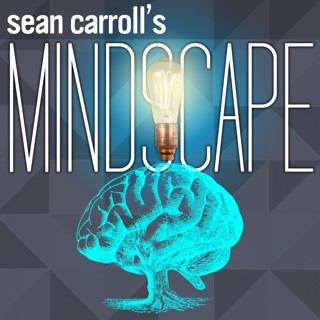
133 | Ziya Tong on Realities We Don't See
It’s a truism that what we see about the world is a small fraction of all that exists. At the simplest level of physics and biology, our senses are drastically limited; we only see a narrow spectrum of electromagnetic waves, and we only hear a narrow band of sound. We don’t feel neutrinos or dark matter at all, even as they pass through our bodies, and we can’t perceive microscopic objects. While science can help us overcome some of these limitations, they do shape how we think about the world. Ziya Tong takes this idea and expands it to include the parts of our social and moral worlds that are effectively invisible to us — from where our food comes from to how we decide how wealth is allocated in society.Support Mindscape on Patreon.Ziya Tong received a B.A. in psychology and sociology from the University of British Columbia, and an M.A. in communications from McGill University. She has served as host, writer, director, producer, and reporter from a number of science programs, most notably Daily Planet on Discovery Canada. She is a Trustee of the World Wildlife Fund, and served on the Board of WWF Canada. Her book The Reality Bubble: How Science Reveals the Hidden Truths that Shape Our World was published in 2019.Web siteIMDb pageWWF pageWikipediaAmazon author pageTwitterSee Privacy Policy at https://art19.com/privacy and California Privacy Notice at https://art19.com/privacy#do-not-sell-my-info.
8 Feb 20211h 37min

Bonus | AIP Oral History Interview
Here is a special bonus punishment treat for Mindscape listeners: an interview of me, by David Zierler of the American Institute of Physics’s Oral History project. This is a fantastic project that collects interviews with influential physicists of all ages, and apparently sometimes less-influential physicists. So if you’d like to hear my (academic) life story boiled down to a mere four hours, here you go!Support Mindscape on Patreon.It’s well worth checking out the AIP Oral History Project website, which has over 1000 fascinating interviews with physicists from different decades. The transcript of this particular interview can be found there. Thanks to David and the AIP for letting us include this as a bonus podcast episode.See Privacy Policy at https://art19.com/privacy and California Privacy Notice at https://art19.com/privacy#do-not-sell-my-info.
4 Feb 20214h 1min

132 | Michael Levin on Growth, Form, Information, and the Self
As a semi-outsider, it’s fun for me to watch as a new era dawns in biology: one that adds ideas from physics, big data, computer science, and information theory to the usual biological toolkit. One of the big areas of study in this burgeoning field is the relationship between the basic bioinformatic building blocks (genes and proteins) to the macroscopic organism that eventually results. That relationship is not a simple one, as we’re discovering. Standard metaphors notwithstanding, an organism is not a machine based on genetic blueprints. I talk with biologist and information scientist Michael Levin about how information and physical constraints come together to make organisms and selves.Support Mindscape on Patreon.Michael Levin received his Ph.D. in genetics from Harvard University. He is currently Distinguished Professor and Vannevar Bush Chair in the Biology department at Tufts University, and serves as director of the Tufts Center for Regenerative and Developmental Biology. His work on left-right asymmetric body structures is on Nature’s list of 100 Milestones of Developmental Biology of the Century.Tufts web siteAllen Center web pageGoogle Scholar publicationsTwitterSee Privacy Policy at https://art19.com/privacy and California Privacy Notice at https://art19.com/privacy#do-not-sell-my-info.
1 Feb 20211h 21min

131 | Avi Loeb on Taking Aliens Seriously
The possible existence of technologically advanced extraterrestrial civilizations — not just alien microbes, but cultures as advanced (or much more) than our own — is one of the most provocative questions in modern science. So provocative that it’s difficult to talk about the idea in a rational, dispassionate way; there are those who loudly insist that the probability of advanced alien cultures existing is essentially one, even without direct evidence, and others are so exhausted by overblown claims in popular media that they want to squelch any such talk. Astronomer Avi Loeb thinks we should be taking this possibility seriously, so much so that he suggested that the recent interstellar interloper `Oumuamua might be a spaceship built by aliens. That got him in a lot of trouble. We talk about the trouble, about `Oumuamua, and the attitude scientists should take toward provocative ideas.Support Mindscape on Patreon.Abraham (Avi) Loeb received his Ph.D. in plasma physics from the Hebrew University of Jerusalem. He is currently the Frank B. Baird Jr. professor of science at Harvard University. He served as the Chair of Harvard’s Astronomy department from 2011-2020. He is Director of the Institute for Theory and Computation of the Harvard-Smithsonian Center for Astrophysics, and Founding Director of Harvard’s Black Hole Initiative. He is chair of the Advisory Committee for the Breakthrough Starshot Initiative. His new book is Extraterrestrial: The First Sign of Intelligent Life Beyond Earth.Harvard Astronomy web pageCenter for Astrophysics web pageWikipediaSee Privacy Policy at https://art19.com/privacy and California Privacy Notice at https://art19.com/privacy#do-not-sell-my-info.
25 Jan 20211h 40min

130 | Frank Wilczek on the Present and Future of Fundamental Physics
What is the world made of? How does it behave? These questions, aimed at the most basic level of reality, are the subject of fundamental physics. What counts as fundamental is somewhat contestable, but it includes our best understanding of matter and energy, space and time, and dynamical laws, as well as complex emergent structures and the sweep of the cosmos. Few people are better positioned to talk about fundamental physics than Frank Wilczek, a Nobel Laureate who has made significant contributions to our understanding of the strong interactions, dark matter, black holes, and condensed matter, as well as proposing the existence of time crystals. We talk about what we currently know about fundamental physics, but also the directions in which it is heading, for better and for worse.Support Mindscape on Patreon.Frank Wilczek received his Ph.D. in physics from Princeton University. He is currently the Herman Feshbach professor of physics at the MIT; Founding Director of the T. D. Lee Institute and Chief Scientist at Wilczek Quantum Center, Shanghai Jiao Tong University; Distinguished Professor at Arizona State University; and Professor at Stockholm University. Among his numerous awards are the MacArthur Fellowship, the Nobel Prize in Physics (2004, for asymptotic freedom), membership in the National Academy of Sciences and the American Academy of Arts and Sciences. He is the author of numerous books, most recently Fundamentals: Ten Keys to Reality.Web siteMIT web pageGoogle Scholar publicationsNobel biographyProfile in Quanta magazineWikipediaTwitterSee Privacy Policy at https://art19.com/privacy and California Privacy Notice at https://art19.com/privacy#do-not-sell-my-info.
18 Jan 20211h 16min

129 | Solo: Democracy in America
The first full week of 2021 has been action-packed for those of us in the United States of America, for reasons you’re probably aware of, including a riotous mob storming the US Capitol. The situation has spurred me to take the unusual step of doing a solo podcast in response to current events. But never fear, I’m not actually trying to analyze current events for their own sakes. Rather, I’m using them as a jumping-off point for a more general discussion of how democracy is supposed to work and how we can make it better. We’ve talked about related topics recently with Cornel West and David Stasavage, but there are things I wanted to say in my own voice that fit well here. Politics is important everywhere, and it’s a crucial responsibility for those of us who live in societies that aspire to be participatory and democratic. We have to think these things through, and that’s what this podcast is all about.Support Mindscape on Patreon.Apologies to Alexis de Toqueville, who wrote an important book whose name I stole, and who is mentioned nowhere in this episode.See Privacy Policy at https://art19.com/privacy and California Privacy Notice at https://art19.com/privacy#do-not-sell-my-info.
11 Jan 20211h 43min

128 | Joseph Henrich on the Weirdness of the West
We all know stereotypes about people from different countries; but we also recognize that there really are broad cultural differences between people who grow up in different societies. This raises a challenge when most psychological research is performed on a narrow and unrepresentative slice of the world’s population — a subset that has accurately been labeled as WEIRD (Western, Educated, Industrialized, Rich, and Democratic). Joseph Henrich has argued that focusing on this group has led to systematic biases in how we think about human psychology. In his new book, he proposes a surprising theory for how WEIRD people got that way, based on the Church insisting on the elimination of marriage to relatives. It’s an audacious idea that nudges us to rethink how the WEIRD world came to be.Support Mindscape on Patreon.Joseph Henrich received his Ph.D. in anthropology from UCLA. He is currently Professor and Chair of the Department of Human Evolutionary Biology at Harvard University. Among his awards are a Fulbright scholarship, a Presidential Early Career Award, the Killam Research Prize, and the Wegner Theoretical Innovation Prize. His trade books include The Secret of Our Success: How Culture is Driving Human Evolution, Domesticating Our Species, and Making Us Smart, and the new The WEIRDest People in the World: How the West Became Psychologically Peculiar and Particularly Prosperous.Personal web siteLab web siteHarvard web pageWikipediaAmazon author pageTwitterSee Privacy Policy at https://art19.com/privacy and California Privacy Notice at https://art19.com/privacy#do-not-sell-my-info.
4 Jan 20211h 27min

Holiday Message 2020 | The Screwy Universe
Welcome to the third annual Mindscape Holiday Message! Just a chance for me to be a little more chatty and informal than usual, although as it turned out this isn’t all that different from a conventional solo episode. With the difference that what I’m talking about — a phenomenon called “cosmic birefringence” — has played a big part in my personal scientific career, so I get to be a bit autobiographical.Every photon has a direction of polarization, which generally remains fixed as the photon travels through space. Birefringence is an effect by which the polarization rotates rather than staying fixed. It can happen in materials, but generally not in outer space. But there are exotic physics ideas that could cause such a rotation, including the dynamical dark energy candidate known as quintessence. People have put limits on such cosmic birefringence for a while now, but recently there was a claim that there might be a nonzero amount of birefringence visible in the polarization of the cosmic microwave background! Still very tentative, but if this hint turns into real evidence, it would big extremely big news for our understanding of physics and cosmology, possibly helping us pinpoint the nature of dark energy.Show notes, links, transcript: https://www.preposterousuniverse.com/podcast/2020/12/21/holiday-message-2020-the-screwy-universe/See Privacy Policy at https://art19.com/privacy and California Privacy Notice at https://art19.com/privacy#do-not-sell-my-info.
21 Dec 20201h 31min





















